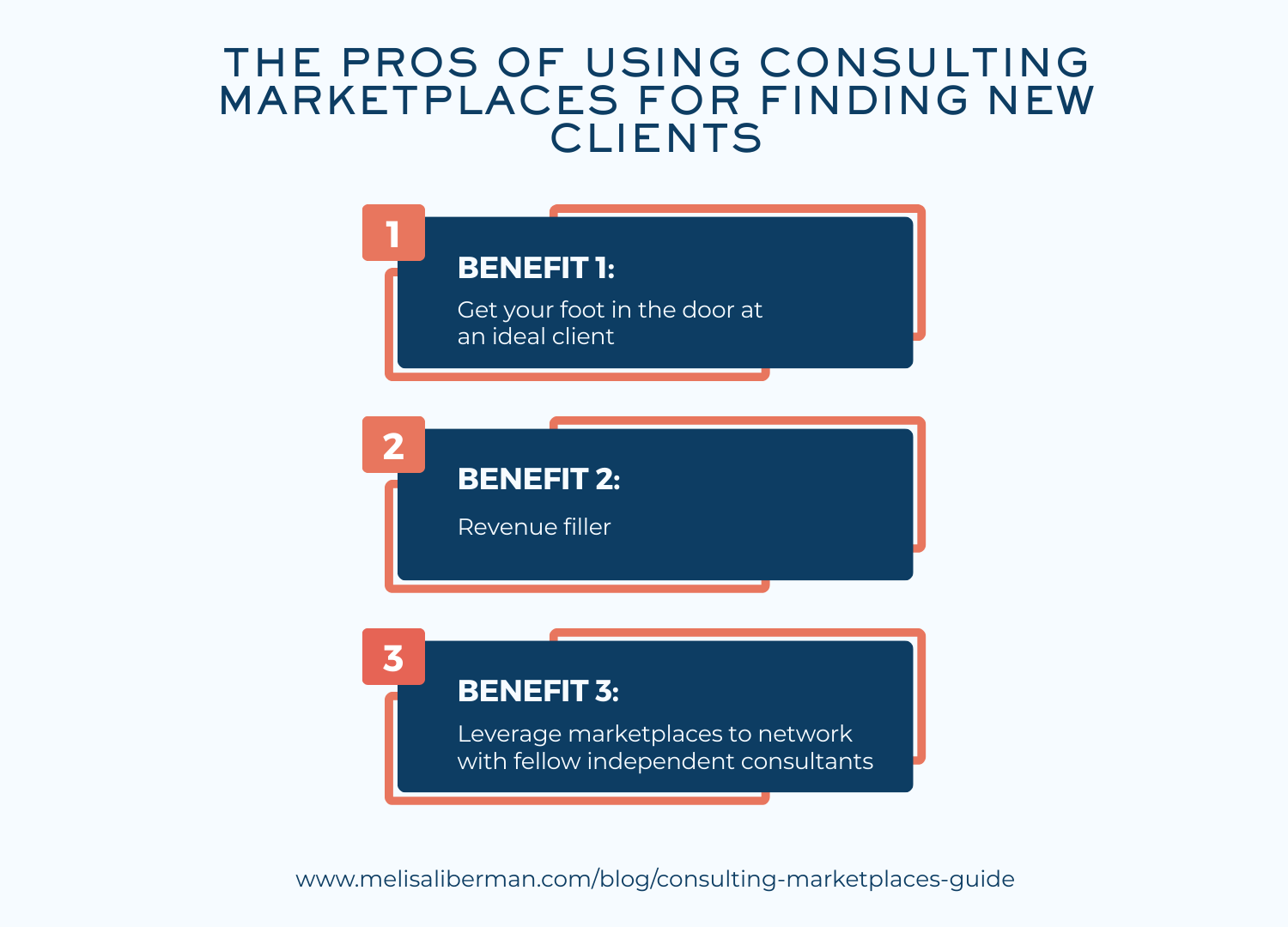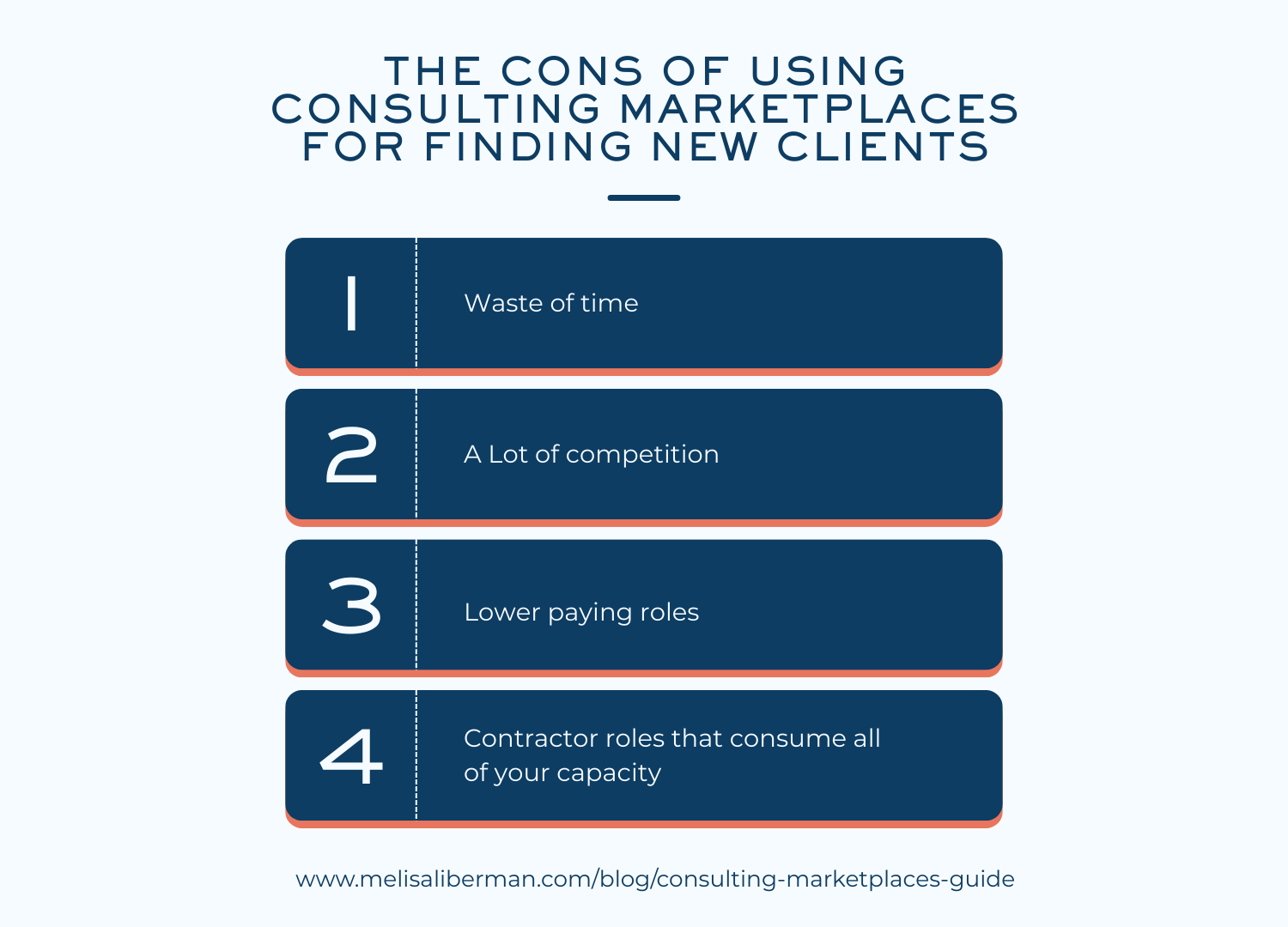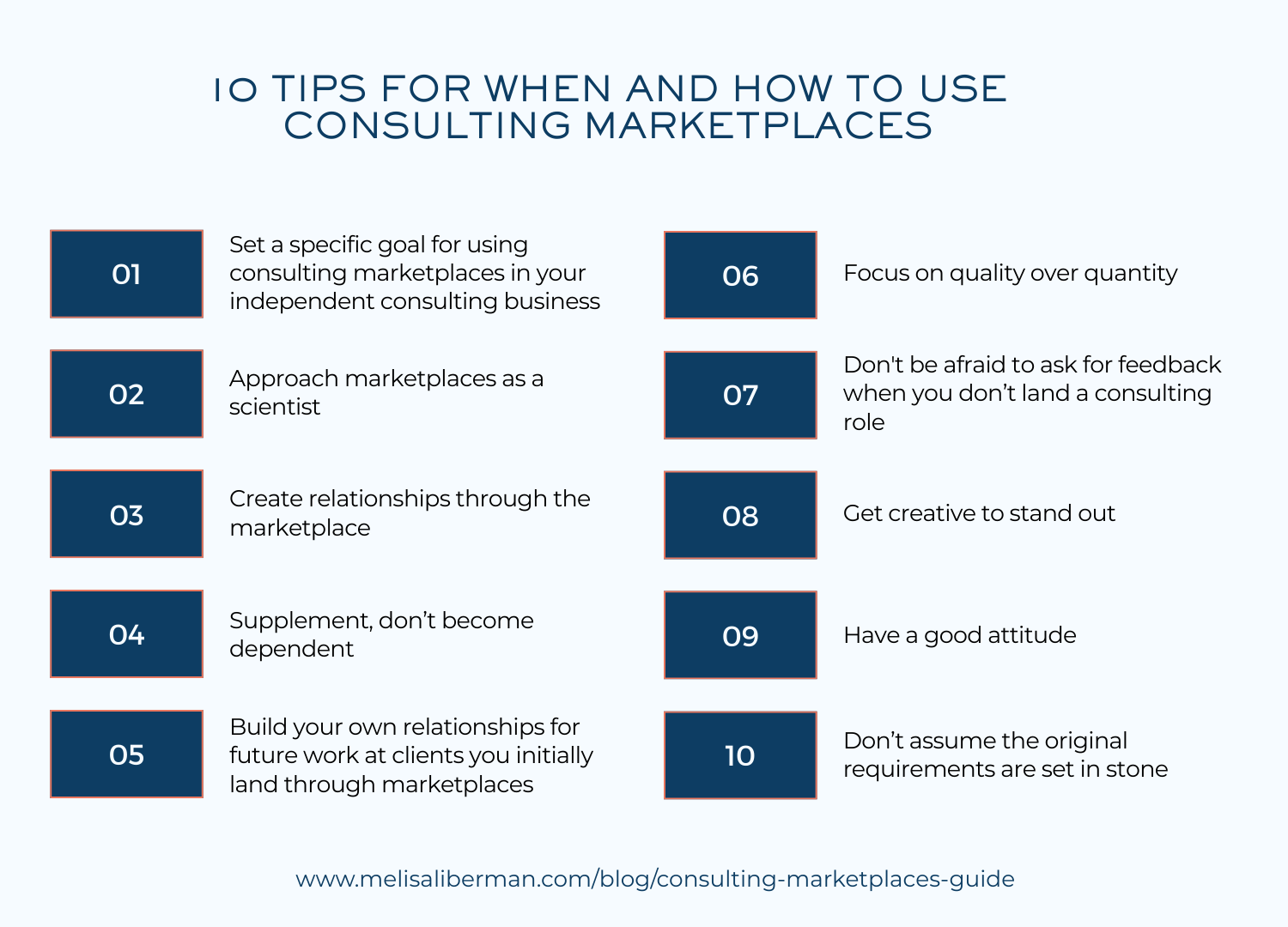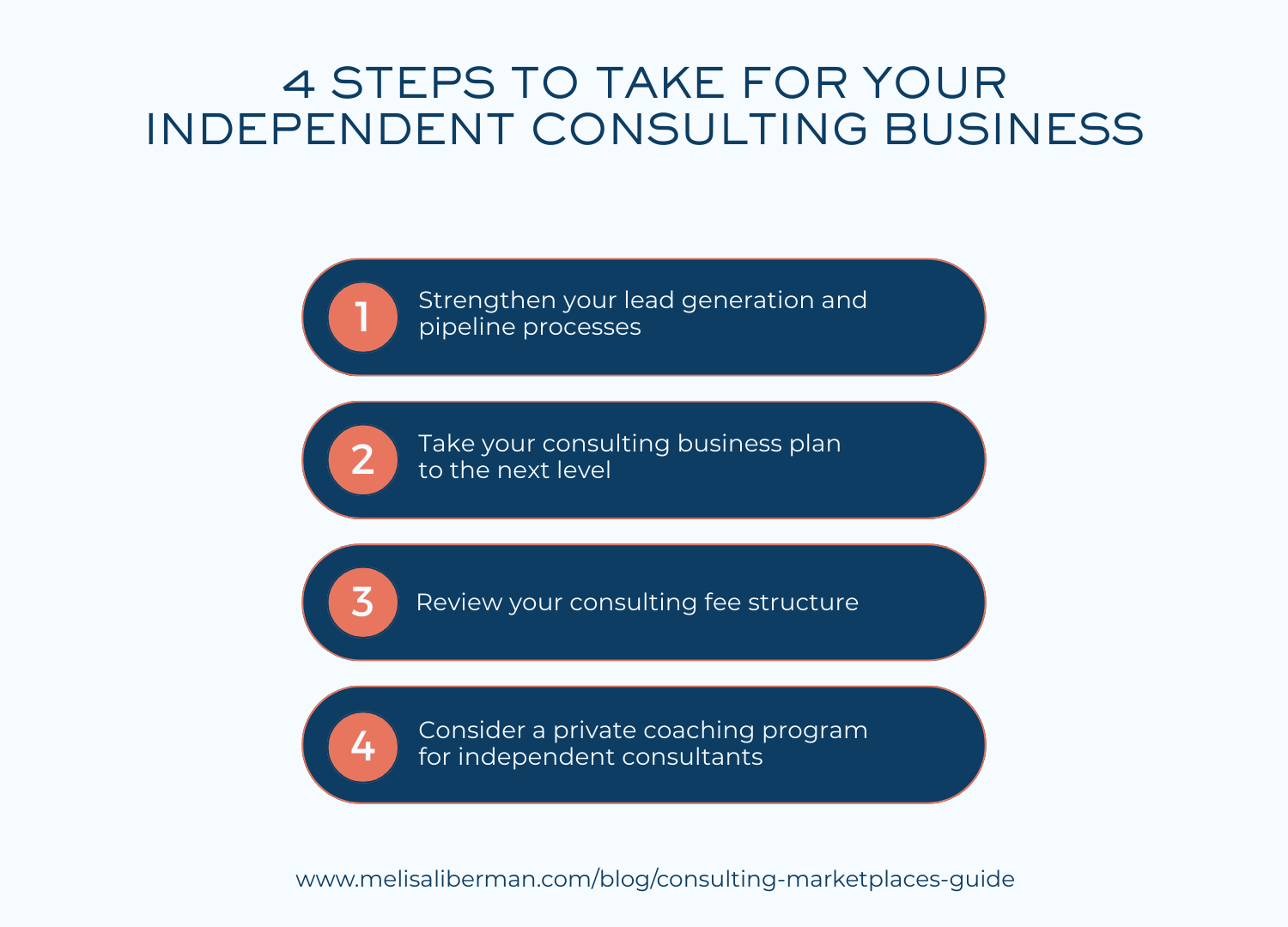The Ultimate Guide to Marketplaces for Consultants
Dec 23, 2022
Estimated Reading Time: 19 minutes
Download the article as a PDF:

Table of contents
- Introduction
- What is a consulting marketplace?
- What are the pros & cons of consulting marketplaces?
- 10 tips for when and how to use consulting marketplaces
- The best consulting marketplaces for independent consultants
- You signed up for a consulting marketplace, now what?
An introduction to consulting marketplaces
There are 100’s, if not 1000’s, of marketplaces dedicated to connecting enterprise clients with independent consultants and freelancers.
New marketplaces are popping up every week, ranging from general, all-encompassing marketplaces to highly specialized marketplaces (e.g. life sciences consulting needs for big pharma).
Marketplaces seem like a great source of consulting work, especially if you’re just starting your independent consulting business or if you have a gap in work you need to fill.
Marketplaces can also be a colossal waste of time. They can also commoditize you as an independent consultant. And, turn you into a pseudo, full-time employee.
But, it doesn’t have to be that way for you. You can strategically leverage marketplaces as a source of independent consulting work.
As someone who has landed multiple six figures in supplemental consulting work through marketplaces, I created this article to share my best tips & tricks on how to use consulting marketplaces as an independent consultant.
What is a consulting marketplace?
A consulting marketplace is a platform and/or service an enterprise has selected as a tool to consolidate and fulfill their needs for external contractors and consultants.
The marketplaces provide corporate clients with:
- Easy access to aggregated talent.
- Facilitation of internal processes (e.g. budgetary approvals, adherence to rate cards, vetting independent consultant designation, invoicing and payment).
Typically, there’s a fee charged to the enterprise client for use of the marketplace. And, it’s also common for the independent consultant to be charged a % of their billings.
What are the pros & cons of consulting marketplaces?
Consulting marketplaces can be an effective tool for your independent consulting business, if leveraged correctly.
Or, if not leveraged correctly, marketplaces can be a time-waster and ultimately lead you to underearn and overwork.
The pros of using consulting marketplaces for finding new clients
There are 3 primary benefits of working through consulting marketplaces:

Benefit 1: Get your foot in the door at an ideal client
Independent consultants can leverage marketplaces to get their foot in the door, to gain access to client work you’d otherwise not know about or have the opportunity to land.
For example, I landed a Fortune 50 consulting client through a marketplace. I joined a marketplace that I knew had access to consulting work at several of my ideal clients. I closely monitored new posting notifications. I highlighted my relevant experience when I submitted my resume and profile to the request or, and I made it very simple for them to schedule time with me by including my calendar link.
I was turned down for the first few opportunities at this company and I responded back to ask for their reason for turning me down. They indicated I didn’t have past experience working for or consulting at that specific company. I didn’t let this stop me. I continued to apply and eventually broke through. A hiring manager contracted me for a short engagement and then I had that experience to highlight as I submitted for consulting roles. This took down the barrier to working for that client and also enabled me to establish a reputation where other hiring managers requested me. Eventually, I was added to their approved vendor list and can do work directly for that client.
Benefit 2: Revenue filler
Independent consultants can utilize marketplaces to fill in revenue gaps, as needed.
One of the independent consulting business owners I coach has been able to leverage a marketplace lead generation strategy to fill in her revenue gaps, and create a steady, growing income stream. She uncovered two specialized marketplaces that frequently have openings that match her skill set and desired type of work. They’re also shorter 6-week to 8-week engagements so she’s not tying up her capacity for months on end.
She monitors these two marketplaces to fill in upcoming gaps and to give herself more flexibility to land work she is excited to take on through her own pipeline.
Benefit 3: Leverage marketplaces to network with fellow independent consultants
Many consulting marketplaces have communities associated with them. You can join these communities to meet other independent consultants, to build referral relationships, and to share learnings.
The cons of using consulting marketplaces for finding new clients
There are 4 primary cons of working through consulting marketplaces:

Con 1: Waste of time
If you aren’t strategic in your use of consulting marketplaces, you can waste a lot of time setting up profiles and submitting consulting proposals with no results.
Con 2: A Lot of competition
Roles posted in consulting marketplaces are typically very competitive because it’s so easy to apply.
Con 3: Lower paying roles
Roles posted in consulting marketplaces are typically lower, paying roles that are set up to pay by the hour.
Con 4: Contractor roles that consume all of your capacity
Roles posted in consulting marketplaces are typically posted as full-time type work. They can tie up your capacity for months, or even years, where you’re doing work that pays but isn’t as fulfilling or flexible.
10 tips for when and how to use consulting marketplaces
Here are 10 tips for when and how to use consulting marketplaces most effectively.

1. Set a specific goal for using consulting marketplaces in your independent consulting business
If you choose to leverage consulting marketplaces as part of your lead generation strategy, be specific. Ask and answer targeted questions:
- What type of work do you want to land?
- For which consulting clients?
- For what percentage of your overall pipeline?
2. Approach marketplaces as a scientist
Choose 2-3 marketplaces you hypothesize will be a good fit for the type of work you want to do and for your ideal consulting clients. Then, commit to making those marketplaces work over the course of 30 - 90 days. Assess, learn and iterate based on the results (or lack of results) you’re seeing.
3. Create relationships through the marketplace
Consider joining marketplaces that have a built in community so you can meet other consultants to refer and share work and lessons learned.
These communities also provide access to the team running the community so you can ask them questions about strengthening your proposals, insight into upcoming opportunities, trends, etc. this helps you stand out as a person (versus just a profile) so you can get advice from the insiders.
4. Supplement, don’t become dependent
You’re an independent consultant, not an employee, for a reason. While consulting marketplaces can be beneficial as one of several lead generation strategies in your business, you want to avoid becoming dependent on consulting marketplaces for new work.
5. Build your own relationships for future work at clients you initially land through marketplaces
As an independent consultant, relationships are imperative to your success.. don’t let a marketplace intermediate or prevent your direct relationship with your consulting client. Set a goal to build value for the ultimate decision-maker at the client so you set yourself up for direct, future work so the client doesn’t want to “go out to bid” in the marketplace to fill consulting needs you’d love to fill for them.
6. Focus on quality over quantity
Identify 2-3 specialized marketplaces you want to test out and then go all in on those marketplaces. Don’t make the mistake of diluting yourself by creating profiles in all the marketplaces.
7. Don't be afraid to ask for feedback when you don’t land a consulting role
Ask for feedback for why you weren’t selected, especially if you had the opportunity to talk to the potential client. Don’t assume they don’t have time. Don’t avoid asking for “negative” feedback you would prefer not to hear. Make it one of your own independent consulting corporate policies that you always request feedback for proposals you didn’t land, even for marketplaces.
8. Get creative to stand out
As you focus on quality over quantity, put thought into what you’re submitting in your consulting proposal to these marketplace roles. Think about what would catch the eye of the hiring manager. Go the extra step to include a personalized note.
9. Have a good attitude
When you’re submitting your proposals through a consulting marketplace, assume you’re the best candidate and you’ll be contacted to interview and discuss your proposal. Give yourself and the marketplace the benefit of the doubt. If you approach the marketplace as a “check-the-box” type activity and you just go through the motions to submit your proposal, you’ll most certainly sabotage yourself and not stand out from the crowd.
10. Don’t assume the original requirements are set in stone
When you set a goal to land work through a consulting marketplace, it helps to break it down into micro-steps. Set your first goal of submitting a proposal that will lead to a conversation with the hiring manager. Then, set the next goal of standing out with the hiring manager, in your conversations. Next, set a goal of fully understanding the decision-makers goals and what they value, so you can position your proposals, pricing in a compelling way. Negotiate when the time is right. Don’t assume that whatever the decision-maker wrote in the initial request is set in stone.
The best consulting marketplaces for independent consultants
There are 100s, if not 1000s of consulting marketplaces available to independent consultants at this point. And, there are new consulting marketplaces popping up every day.
So, there’s not a one-size fits all solution when it comes to the best marketplaces for independent consultants.
With that said, I recommend you find several marketplaces that meet one (or more) of these three criteria.
Criteria 1: Marketplaces utilized by your ideal clients
Research to find those marketplace that are used by your ideal client companies. As I mentioned above, you can leverage a marketplace to get your foot in the door at one of your targeted, ideal clients.
Criteria 2: Skill-specialized marketplaces
Target consulting marketplaces that focus on the types of consulting that you specialize in.
Criteria 3: A marketplace that provides direct access and a community so you can network, get feedback, and continuously improve
Choose marketplaces that have an associated community and/or services for consultants. These companies are focused on providing value to both their enterprise customers and also to independent consultants, as opposed to most marketplaces where you are simply another number in their database of consultants.
Three companies that have communities attached to their marketplaces are:
You signed up for a consulting marketplace, now what?
So, you tackled consulting marketplaces as one source of leads for your consulting business. This strategy can be effective when used in conjunction with other lead generation strategies where you have more control.
With this said, there are several next steps to take for your independent consulting business.

1. Strengthen your lead generation and pipeline processes
Click here for the Ultimate Guide to Lead Generation for Independent Consultants
2. Take your consulting business plan to the next level
A consulting business plan is a roadmap that you develop so you know what the big picture is for your business and how you’re going to achieve it. Get started today with my guide and free consulting business plan template.
3. Review your consulting fee structure
First, take the Pricing Assessment for Independent Consultants by clicking here.
Then, I recommend my guide on “How Independent Consulting Fees and Retainers Work”.
4. Consider a private coaching program for independent consultants
Explore the scale-IC Program™️ is specifically designed for independent consultants who want to make more money and live a flexible lifestyle




